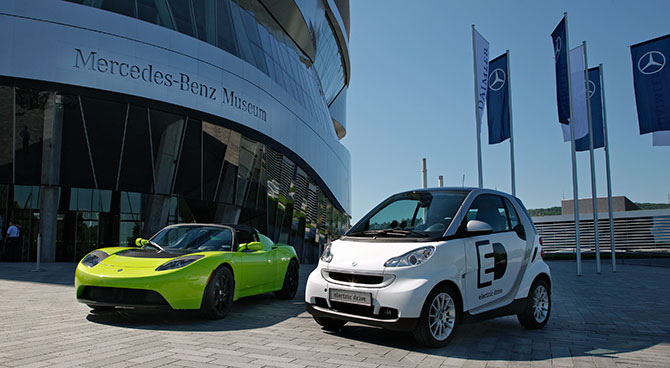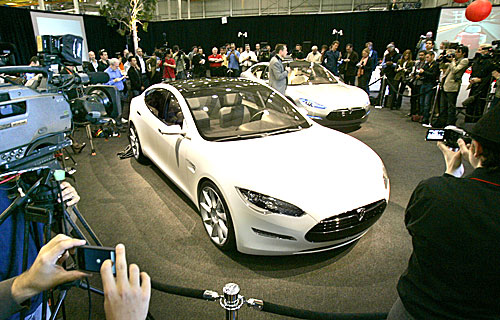
Daimler’s investment in Tesla Motors provides both companies with something they desperately need and could be the first step down the aisle toward marriage.
The world’s oldest automaker hitched its electric wagon to Tesla on Tuesday when it bought nearly 10 percent of the company and a seat on its board. Neither side is discussing specifics of the deal, reportedly worth $50 million, but both sides walk away winners.
Tesla gets a much-needed infusion of cash and help building the gorgeous Model S sedan. More importantly, Tesla gains legitimacy as it continues raising funds. Having the company that invented the automobile as a partner makes you much more attractive to investors.
Daimler’s investment buys it a whole lot of battery know-how, something German automakers are short of. And a seat on the board gives Daimler gets a close look at Tesla’s business plan and financials so it can decide if it wants a bigger piece of the action.
“I think that’s the long-term plan,” said Anuj Patel, an analyst with CSM Worldwide. “They’re going on a first date to see how it goes. Daimler is playing it safe, paying a relatively small amount to get in the door and take a test drive before buying the whole thing.”
Tesla downplayed such speculation. Sort of.
“You can never predict the future,” said Michael van der Sande, senior vice president of sales and marketing. Daimler, he said, “obviously like Tesla for our technology and experience,” but also was drawn to its entrepreneurial spirit and speed to market. Making Tesla part of a multinational conglomerate would undermine that Silicon Valley way of business, he said.
“They’re specifically interested in us being small and agile, and it makes much more sense for us to develop at our own pace,” he said. “I don’t think they want to integrate.”
Aaron Bragman of IHS Global Insight doesn’t see it that way. He’s long argued that selling out to a bigger player is the only way Tesla can be anything more than a niche automaker.
“That’s honestly where I see Tesla ending up – being purchased by someone else that will take control of the company,” he said. “That’s the typical MO for a Silicon Valley company. I see it happening within five years.”
Several industry watchers said Daimler isn’t after the Roadster of Model S. It’s Tesla’s formidable battery expertise Daimler wants.
“Tesla’s engineering and building experience is nothing Daimler would want,” said Eric Noble, president of the Car Lab, an automotive engineering and consulting firm. “The German automakers are rather far behind with regard to battery technology and anything having to do with hybrids and EVs. This is a relatively cheap way for Stuttgart to put a stethoscope to the heart of what is said to be one of the leading EV companies.”
The two companies have spent 18 months working together on Daimler’s budding Smart EV program. The Germans were impressed enough to broker a deal for 1,000 battery packs and chargers in January, then came back for more.
Noble doesn’t think Daimler is interested in making Tesla part of the family because it already already has 11 brands covering everything from Smart city cars to Freightliner trucks.
“It doesn’t need another mouth to feed,” he said.
He said Daimler will be reluctant to join forces with another automaker, even one so small as Tesla Motors, after its disastrous merger with Chrysler.
“One would think they’re still smarting from that experience and would have learned from it,” he said.
Regardless of Daimler’s long-range plans, Tesla wins in the end. Aside from raising cash, Tesla now has one of the world’s biggest automakers in its corner. That will make it much more attractive to investors and could make the Department of Energy more likely to approve the $350 million loan Tesla needs to build a factory for the Model S.
It also gives Tesla access to some sharp engineering, a big pile of parts for Model S and access to a global supply chain. Van der Sande said the two companies “have an agreement in principle” but are still working out what that will mean for Tesla.
“We have a broad agreement that we can draw on Daimler’s help where we need it,” in areas like engineering, components and testing, he said.
Although the company rolled out two stunning Model S prototypes in March, they were show cars. Dan Neil of the Los Angeles Times is the only person outside the company known to have driven the S, and he called it “just barely ambulatory.” Franz von Holzhausen, the car’s designer, conceded the S is “90 percent there on outside and about 40 percent there on the inside.”
Still, Tesla CEO Elon Musk has said the car will be on the road in 2011 with a sticker price of $57,400. That’s an incredibly tight time frame for a car Tesla is designing on its own from the ground up. Several analysts said Tesla’s only hope for meeting that deadline is to have Daimler throw open its parts bin and say, “Take what you need.”
“It makes it very much more likely that Tesla will hit the 2011 timeline,” Noble said. “Engineering the suspension components and other systems is very time consuming and very expensive.But it will be the final nail in the coffin of Tesla’s plan to sell that car for $57,000. ‘German’ and ‘cheap’ don’t go together.”
Musk, who was returning from Germany and unavailable for comment, appears undeterred. In a statement, he said the Daimler deal “will accelerate bringing our Tesla Model S to production and ensure that it is a superlative vehicle on all levels.”
We’ll see.
Photo: Daimler
By Chuck Squatriglia May 21, 2009
Source: Wired
Source: Los Angeles Times
The German automaker buys nearly a 10% stake in the California electric car maker, which had recently turned to low-cost federal loans.

After much bated breath and drawn-out anticipation, it’s finally here: Tesla Motors’ Model S electric sedan. Ken Hively, Los Angeles Times Photographer
German automaker Daimler has bought nearly 10% of Tesla Motors Inc., giving a financial boost to the California electric car company.
Daimler, which owns Mercedes-Benz, didn’t disclose the amount of the investment, saying only that, priced in euros, the amount was in “eight figures.”
In January, Daimler selected Tesla to provide batteries and chargers for the German company’s Smart EV electric car.
The investment in Tesla “enables the partners to collaborate even more closely on the development of battery systems, electric drive systems and in individual vehicle projects,” the companies said in a news release.
Tesla currently makes a $109,000 all-electric, two-seat roadster. In March, the San Carlos company unveiled a prototype of its $57,400 Model S electric sedan. Tesla plans to build the car, which gets 160 to 300 miles on a single charge depending on the version, at a plant in Southern California beginning in late 2011.
Tesla recently failed to complete a $100-million round of outside venture funding and settled for a smaller, $40-million round from investors who already had a stake in the company. To make up the gap, it has turned to low-cost federal loans as its best option for financing. Those loans have not yet been approved.
Teaming with Daimler will give Tesla access to the German company’s “engineering production and supply-chain expertise,” Tesla Chairman Elon Musk said in a statement. “This will accelerate bringing our Tesla Model S to production and ensure that it is a superlative vehicle on all levels.”
The deal expands Daimler’s access to Tesla lithium-ion battery technology. Under the January agreement, Tesla agreed to provide 1,000 batteries to Daimler this year and next.
As part of the deal, Herbert Kohler, Daimler’s vice president of electric-drive systems, will become a member of Tesla’s board of directors.
By Martin Zimmerman
May 20, 2009